Follow us on Telegram and on Instagram @humanresourcesonline for all the latest HR and manpower news from around the region!
share on
These can be used for all forms of indoor workspaces including offices, factories, warehouses, laboratories, engineering facilities, broadcasting studios, as well as any other premises where people can gather in enclosed spaces.
Malaysia has begun its transition to an endemic phase of COVID-19, effective today (Friday, 1 April 2022).
In light of this, the National Security Council (Majlis Keselamatan Negara, or MKN) has today released a set of guidelines for employers and HR leaders to follow, in "living and working safely with COVID-19."
As shared by MKN, these guidelines can be used for all forms of indoor workspaces including buildings and premises such as offices, factories, warehouses, laboratories, engineering facilities, broadcasting studios, as well as any premises that may have the potential to cause people to gather in enclosed spaces.
"These guidelines are encouraged to be complied with and are used to illustrate requirements in the standard operating procedures (SOPs). The SOPs are (to be) prioritised if there are any contradictions", the council added.
An excerpt of the guidelines is as follows:
Assessing COVID-19 risks to make safer choices - Four key factors to consider

#1 Location
Well-ventilated areas such as outdoor are safer than enclosed spaces such as indoors.
#2 Proximity
Maintain physical distancing of at least one metre, between individuals is safer than crowding.
- Limit face-to-face social interactions between employees from different households (examples: working hours according to shifts, and staggered break times).
- Avoid physical greetings such as handshakes. Instead, gree by placing your hands on your chest.
- Working from home is encouraged.
- Individuals who are symptomatic, COVID-19 positive, or under home surveillance order (HSO) are not allowed to enter premises or conduct activities.
#3 Duration
Interacting for a shorter duration is safer than interacting for a longer duration.
#4 Masking
Wearing a face mask is safer than being mask-off.
With indoor-based work posing a higher risk of infection given the enclosed spaces, employers or premise owners "should strive to improve the ventilation system and focus on improving indoor air quality.
"Additional attention must be paid to activities where face masks are not worn, such as in dining areas/ pantries/ cafes as well as in workers' accommodation."
How to manage COVID-19 cases and close contacts
Employers are to prepare a set of health and safety protocols and manage symptomatic individuals, confirmed cases of COVID-19, and close contacts based on COVID-19 Management Guidelines for Workplaces set out by the Ministry of Health (Annex 25).
In the event a COVID-19 case is identified at the office, employers are to:
- Carry out cleaning and disinfecting process based on Annex 36. and
- Cover the cost of testing if employees are identified as symptomatic while on the premises or at the locations where activities are held, and the cost of cleaning and disinfecting on premises;
- Employers are required to cover the cost of isolation for confirmed cases, and the cost of quarantine for close contacts. For civil servants, this is subject to government circulars from time to time;
- Accept digital HSO for employees who are suspected or confirmed cases of COVID-19 as proof of employee undergoing isolation or quarantine, and
- If a COVID-19 cluster is detected at a particular premise, report it to the nearest District Health Office promptly.
If you or your employee showcases any COVID-19 symptoms — fever, fatigue, breathing difficulty, body/muscle ache, headache, runny nose, cough/sore throat, vomiting/diarrhea, loss of sense of taste/smell —, be sure to use the TRIIS self-assessment method:
- Test: Get tested with a self-test kit as soon as possible, if you are experiencing any infection symptoms.
- Report: Report the test results (negative, positive, or invalid) on MySejahtera immediately.
- Isolate: Isolate immediately with discipline if tested positive for COVID 19. Adhere to the HSO imposed by MOH.
- Inform: Inform close contacts and immediate family members urgently if test result is positive. List out close contacts' information and assess health through HAT 2 on MySejahtera. A virtual CAC will monitor your/your employee's health status and contact you/your employee if necessary.
- Seek: Seek immediate treatment at any healthcare facility nearby if you are experiencing worsening symptoms.
The following infographics share the detailed steps to take:
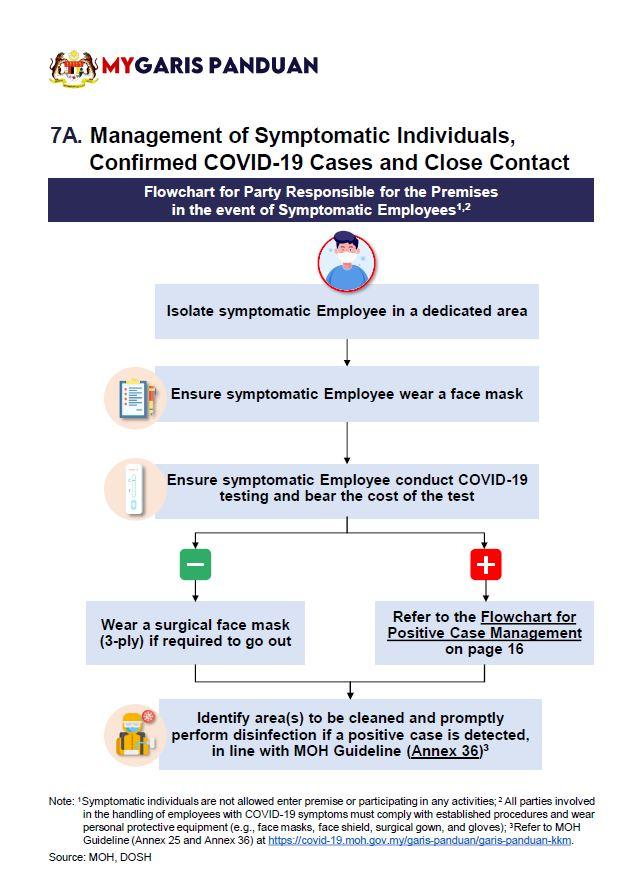
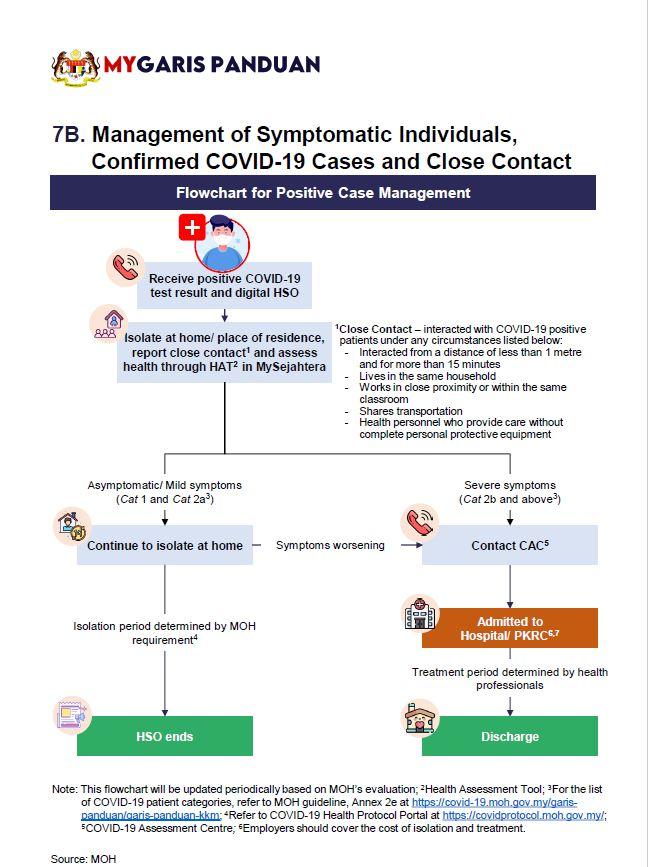
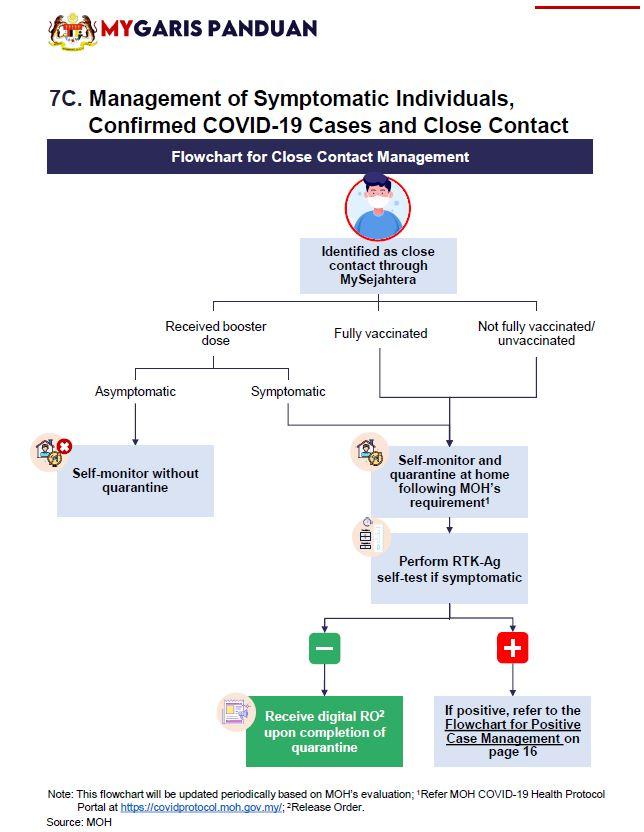
Have in place staggered working hours and breaks
Employers are encouraged to stagger the start time for all employees (one group of employees arrive before 10am and the others arrive after 10am). This allows employees to plan their commute and avoid rush hour crowding, especially when using public transport.
Employers are also encouraged to implement staggered break hours in order to limit contact between groups. For example,
- Team A goes for lunch at 11am
- Team B goes for lunch at 12pm
- Team C goes for lunch at 1pm
ALSO READ: Capacity limit at the workplace abolished from 1 April 2022 as Malaysia gears up for endemic phase
Definition of "fully vaccinated"
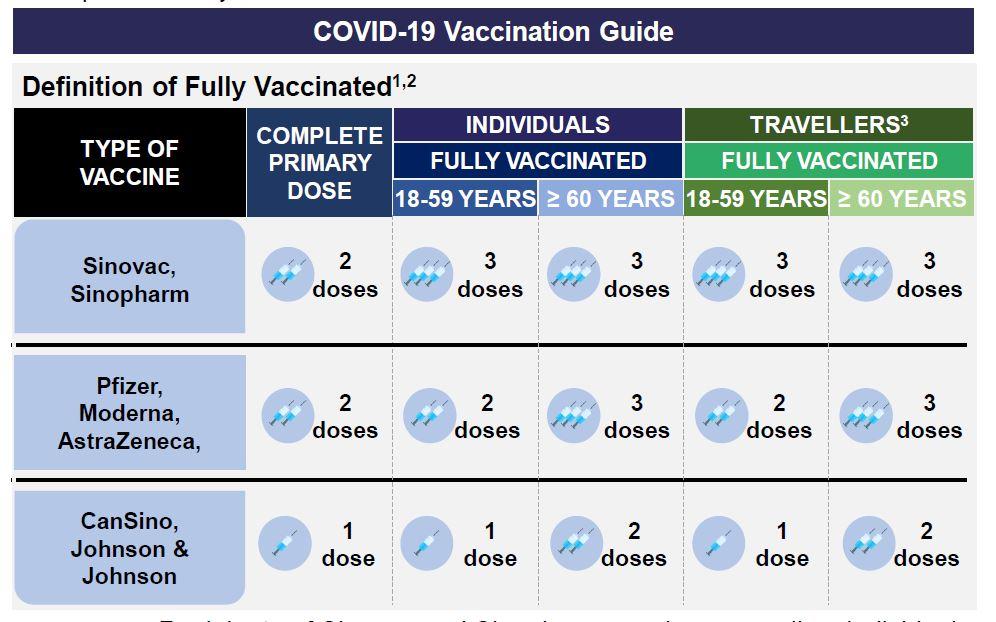
According to MKN, recipients of Sinovac and Sinopharm vaccines, as well as individuals aged 60 years and above, who have not received their booster dose are allowed to perform activities that are permitted for individuals who are fully vaccinated.
Individuals must show proof of their fully vaccinated status, such as cards or digital certificates, in order to participate in activities with vaccination requirements.
However, individuals who are not eligible for vaccination (due to health reasons and have been verified by registered medical practitioners) must refer to the latest applicable guidelines.
Managing workers' accommodation
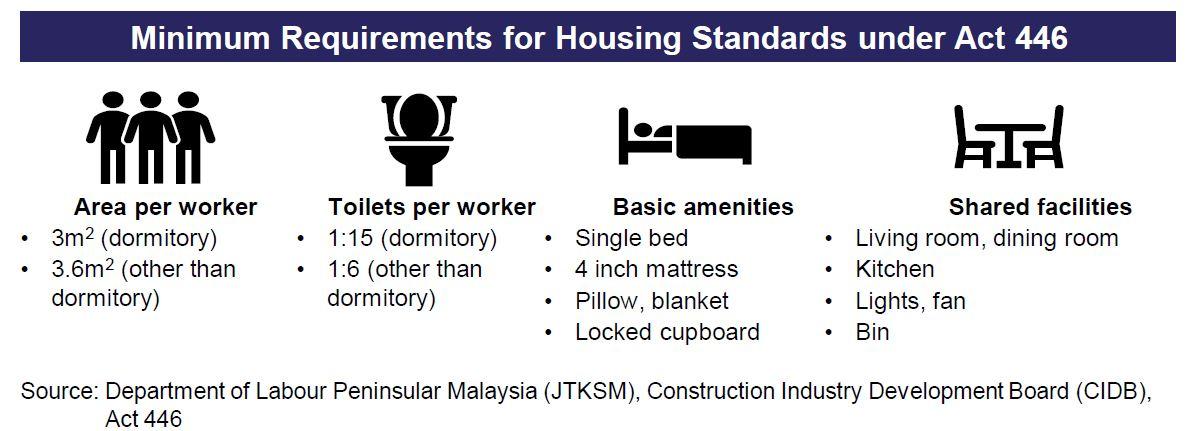
Employers must comply with the minimum standards stated by the Minimum Standards of Housing, Accommodation and Employee Facilities Act 1990 [Act 446] in addition to the actions stated below:
#1 Cleaning & disinfection
- Frequent cleaning in communal areas and high-touch surfaces after breaks.
- Provide and regularly empty rubbish bins with cover/ lid.
- Provide handwashing facilities with soap and water or hand sanitisers.
- Disinfect common touch surfaces at workers’ accommodation using liquid bleach or disinfectant containing at least 70% alcohol if positive case is detected.
#2 Worker movement
- Workers are to remain within the accommodation compound and are encouraged to stay in their respective rooms.
- Provide direct transportation between workers’ accommodation and the workplace.
- Staggered breaks for each group of workers to reduce crowding in resting areas.
#3 Health monitoring
- Perform self-test if employee is symptomatic and upload test results on MySejahtera application.
- If negative:
- Employees can return to work by wearing a surgical mask (three-ply) and maintaining physical distancing.
- If positive:
- Employees must isolate in the designated isolating room and perform daily health assessments through the Health Assessment Tool in the MySejahtera application.
- Management to immediately trace close contacts of positive patients.
- If negative:
DON'T MISS: Malaysia's endemic guidelines, effective 1 April 2022: For the general public
Photo / 123RF
share on


